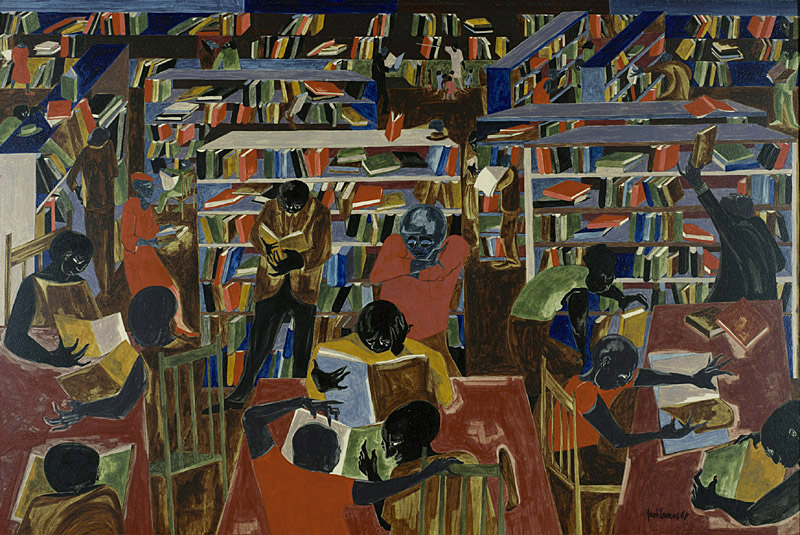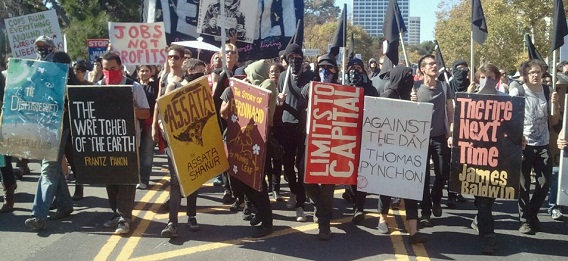by Rustbelt Radical
February 22, 2013
If you are like me you know that, other than the game of baseball (not to be confused with the MLB), the only thing standing between the United States and full on barbarism is the public library.
I know, there are dark clouds of austerity overhead and the business model far too many library systems have adopted threatens to undermine their commonwealth essence. In line at the main branch the other week, when my turn came to check out I was ushered to the desk with a “next customer.” Customer?!

“The Library,” Jacob Lawrence (1967)
Still, it might be the only institution of the bourgeois state wholly undeserving of being smashed. Indeed, I suspect that there will be more than a few librarians in the ranks on the ramparts when that day comes. You will know them by their worn, sensible shoes and how, with quiet insistence and their glasses slipping down their noses, they build a barricade properly.
It’s not just books, music and movies that libraries offer. My library has public rooms for meetings, even commie ones. Yesterday, as I peeked in the meeting room, an elderly lady was leading two young men in chanting a mantra. (At least, I think that is what was going on.) It has access to computers, classes to write resumes and for adult reading, information for new immigrants and new mothers, help with taxes, group gardening get-togethers and so much more. All this by virtue of being a member of the community.
Even though budget cuts have meant less new books or periodicals and other services, a library will often carry volumes, especially older ones, impossible to find other places. Books are not treated as disposable commodities there, but as resources to be kept and cared for so that they might be used and enjoyed again and again by a myriad of people over years.
I was one of those kids who skipped school to go to the library. I took the city bus to school every morning and if I stayed on it, the bus would pass school and take me downtown to the main branch of the Cincinnati Public Library. It was a safe place to cut classes–who questions a kid at a library?
Yes, I love a good library.
Think of what could be done with the library principle. Think of all of all the things you use that could be checked out instead of bought. Every working class street in the country has a lawn mower for every house and half of them have a full wood working shop in the garage and could outfit several teams of various sports with the equipment piled up in the basement. Why do we each need our own lawnmower? So if we have to, we can all mow at the same time? The street needs one lawn mower (maybe two), one wood working shop. And think of the activities we might do with items on loan instead of bought. How many bedazzlers or baseball bats or roller skates do we really need to produce to meet the need? And we don’t each need our own tool box or bike. My library of the future has those too.
And cars? Daily travel to work or appointments or to the store by public transportation, but how about that road trip up north? No problem, take a jeep and guide to scenic byways out with your library card. And then think of how, if items were used that way, we would produce and care for those items. Instead of making as many as possible, we might produce as sturdy as possible or as (gasp) useful as possible. We could even have meetings in one of those rooms the library offers to discuss what the neighborhood would find useful to begin with.
The biggest change required by libraries after the revolution (other than their expansion into many realms) is the abandonment of the Library of Congress classification system. While the Dewey Decimal System may have its flaws, it doesn’t place criminology (HV) right next to Marxism (HX) on the shelf.

The “book bloc” of Occupy Oakland
Then there are our opponents. The ones with whom the next civil war will be fought. Those who abhor the library’s principle of shared services and public access. Those for whom the only thing public should be executions. They want us to live behind razor wire and “No Trespassing” signs; each in our own private bunker, clutching on to an assault rifle and with the crosshairs on our neighbor, our children raised in fear of the “savage.” The ones who want the world to look too much like it already does. And though they might have taken The Fountainhead out on loan once, they read their Rand and firmly believe that “civilization is the progress toward a society of privacy. The savage’s whole existence is public, ruled by the laws of his tribe. Civilization is the process of setting man free from men.”
We, however, agree with Marx that “only in community [has each] individual the means of cultivating [their] gifts in all directions; only in the community, therefore, is personal freedom possible.” The next war will be fought, in part, over public libraries. To the barricades comrades!
This piece originally appeared on the blog of Rustbelt Radical. The Rustbelt Radical blogs from the ravaged middle of the post-industrial American Midwest and yearns for the refounding of the Marxist project.

Comments
One response to “Public Libraries or Private Bunkers: The Next War”
The essence of the public library is this: it is the only institution in capitalist society has no other agenda than the sharing of information. And information is power.
The media have a different agenda: profit.
The non-profit media have a different agenda: pushing their own cause or their funders’ cause.
Education has a different agenda: maintaining the forms of production.
Advertising? Well…
Art has a different agenda: the sharing of only new information, and only that which is an end in itself.